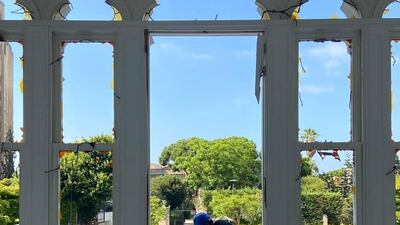More than seven months after the Beirut blast, the rehabilitation of the Lebanese capital’s heritage and cultural sites is underway, but funding remains uncertain.
Speaking on the opening day of the Culture Summit Abu Dhabi on Monday, Sarkis Khoury, director general of antiquities at Lebanon’s Ministry of Culture, made a plea for financial support from the culture organisations around the world.
“These landmarks are part of our tangible and intangible heritage and need urgent attention,” he said. “I ask the assistance of the international community to help save Beirut’s cultural heritage.”
In a session titled Beirut: Public and Private Support to Post-disaster Rehabilitation, Khoury outlined the extent of the damage caused by the explosion in August on heritage and cultural areas, as well as the government’s plans to repair and rebuild them.
He explained that the timeline for recovery will be affected by the funding, which is currently low. “With a budget of $200 million, we can rebuild the heritage buildings in three years, but right now we don’t have the budget, so it all depends on the funding,” he said, adding that the ministry has received a “small fund” from Unesco.
Though the rehabilitation of cultural sites has been supported by Unesco’s emergency fund, Chiara Dezzi-Bardeschi, programme coordinator for Unesco’s Li Beirut initiative, urged the international community to provide more support, particularly from the organisation’s member states.
Affected areas include the neighbourhoods of Mar Mikhael and Gemmayzeh, once teeming with art and culture spaces. Now, businesses in these areas are struggling in the face of infrastructural damage alongside Lebanon’s currency crisis and the Covid-19 pandemic.
Khoury pointed out that the problems in the cultural economy could have an impact on all of Lebanon. He highlighted that artisans, including carpenters, textile workers and tailors, have lost their livelihoods due to the explosion. “In one instant, their homes and years of labour have disappeared,” he said.
He also referred to the neighbourhoods as the “cultural heart” of the city that had been “ripped out” by the port blast, which caused hundreds of casualties and left 300,000 homeless. In total, he says that out of the 850 heritage sites in Beirut, 713 were damaged by the explosion, and around 64 art galleries and cultural spaces have been affected, too.
After the devastating August explosion, Lebanon created a Crisis Committee of Heritage with 40 experts that formulated a rehabilitation plan for the heritage sites and cultural spaces. The government also collaborated with Unesco to receive support in terms of funding and expertise, and received assistance from Blue Shield, International Council on Monuments and Sites, and the International Alliance for the Protection of Heritage in Conflict Areas – Aliph.
In the first phase, efforts focused on “structural propping”, which included repairing roofs to protect the building’s interiors from rainfall and ensuring that the structures do not risk collapse.
The second phase concentrates on restoration and to “secure inhabitants to remain in their dwellings and urban spaces”. Under this phase, the ministry has also launched an Adopt a House initiative, where private donors can offer to fund the recovery of specific structures.
It is here that the funding becomes insufficient. “In the second phase, we don’t have any funds from the international organisations. We only have Lebanese initiatives. It’s not very much. It’s only 10 per cent of the budget. We need a lot for the restoration process,” Khoury explained.
The director general also commended the efforts of Beirut residents in helping rebuild their city. “If not for the solidarity among citizens, the situation would have been far worse."


